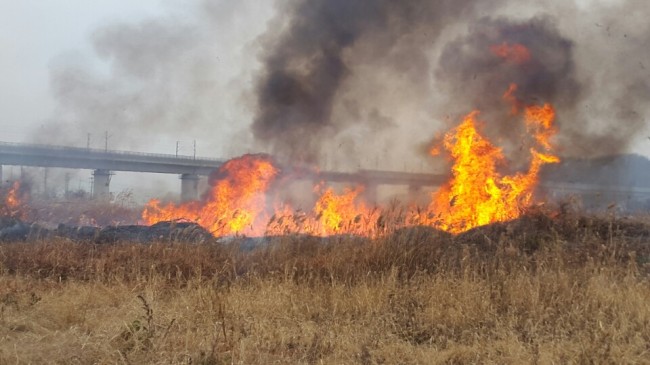3.4 million poultry culled nationwide as bird flu spreads
By Kim Da-solPublished : Dec. 5, 2016 - 17:21
Twenty days after a highly pathogenic avian influenza virus was first detected in South Korea, the epidemic shows no sign of abating. Nearly 3.4 million poultry had been culled as of Monday morning.
According to the Ministry of Agriculture, Food and Rural Affairs, some 2.5 million chickens, 790,000 ducks and 71,000 quails have been slaughtered nationwide as part of the quarantine, after nearly 70 farms were confirmed or suspected of having avian influenza, or bird flu, outbreaks.
Most of the ducks were culled at farms in Eumseong and Jincheon in North Chungcheong Province, two of the hardest hit areas. Those two places account for more than half the farm ducks in North Chungcheong Province.
So far, 69 farms in seven cities and provinces have confirmed H5N6 cases since Nov. 16, when the H5N6 strain of bird flu was first reported at a chicken farm in Haenam, South Jeolla Province.
According to the Ministry of Agriculture, Food and Rural Affairs, some 2.5 million chickens, 790,000 ducks and 71,000 quails have been slaughtered nationwide as part of the quarantine, after nearly 70 farms were confirmed or suspected of having avian influenza, or bird flu, outbreaks.
Most of the ducks were culled at farms in Eumseong and Jincheon in North Chungcheong Province, two of the hardest hit areas. Those two places account for more than half the farm ducks in North Chungcheong Province.
So far, 69 farms in seven cities and provinces have confirmed H5N6 cases since Nov. 16, when the H5N6 strain of bird flu was first reported at a chicken farm in Haenam, South Jeolla Province.

Over the weekend, a chicken farm in Cheorwon, Gangwon Province, also tested positive for the highly pathogenic strain of the virus.
It was the first time the virus outbreak had been confirmed in Gangwon Province, since the outbreak was mostly reported in towns by the west coast and throughout Gyeonggi Province.
The Gyeongsang provinces remain unaffected by the virus, but experts warn it is just a matter of time until it spreads there.
Farmers worry the damage is so widespread it may have a lasting impact on the nation‘s poultry business.
“Even if the authorities have the situation under control, the economic damage is already too severe to calculate. It will take a long period of time for the region to recover,” a farmer said.
According to the ministry’s emergency guideline for bird flu outbreaks, the movement of stockbreeders at flu-hit poultry farms is banned for 30 days after they complete the slaughtering process of affected poultry.
In 2014, when the country’s worst bird flu outbreaks hit North Chungcheong Province, the movement ban was lifted 88 days after the first virus case was detected. Nearly 1.8 million poultry were culled.
By Kim Da-sol (ddd@heraldcorp.com)
It was the first time the virus outbreak had been confirmed in Gangwon Province, since the outbreak was mostly reported in towns by the west coast and throughout Gyeonggi Province.
The Gyeongsang provinces remain unaffected by the virus, but experts warn it is just a matter of time until it spreads there.
Farmers worry the damage is so widespread it may have a lasting impact on the nation‘s poultry business.
“Even if the authorities have the situation under control, the economic damage is already too severe to calculate. It will take a long period of time for the region to recover,” a farmer said.
According to the ministry’s emergency guideline for bird flu outbreaks, the movement of stockbreeders at flu-hit poultry farms is banned for 30 days after they complete the slaughtering process of affected poultry.
In 2014, when the country’s worst bird flu outbreaks hit North Chungcheong Province, the movement ban was lifted 88 days after the first virus case was detected. Nearly 1.8 million poultry were culled.
By Kim Da-sol (ddd@heraldcorp.com)



![[Herald Interview] 'Amid aging population, Korea to invite more young professionals from overseas'](http://res.heraldm.com/phpwas/restmb_idxmake.php?idx=644&simg=/content/image/2024/04/24/20240424050844_0.jpg&u=20240424200058)













![[KH Explains] Korean shipbuilding stocks rally: Real growth or bubble?](http://res.heraldm.com/phpwas/restmb_idxmake.php?idx=652&simg=/content/image/2024/04/25/20240425050656_0.jpg&u=)

